Related Research Articles

Blue Skies is a 1946 American musical comedy film directed by Stuart Heisler and starring Bing Crosby, Fred Astaire, and Joan Caulfield. Based on a story by Irving Berlin, the film is about a dancer who loves a showgirl who loves a compulsive nightclub-opener who can't stay committed to anything in life for very long. Produced by Sol C. Siegel, Blue Skies was filmed in Technicolor and released by Paramount Pictures. The music, lyrics, and story were written by Irving Berlin, with most of the songs recycled from earlier works.

"Cry Me a River" is a popular American torch song, written by Arthur Hamilton, first published in 1953 and made famous in 1955 with the version by Julie London.

Mona Maris was an Argentine film actress.

José Mojica Marins was a Brazilian filmmaker, actor, composer, screenwriter, and television horror host. Marins is also known for creating and playing the character Coffin Joe in a series of horror films; the character has since gone on to become his alter ego as well as a pop culture icon, a horror icon, and a cult figure. The popularity of Coffin Joe in Brazil has led to the character being referred to as "Brazil's National Boogeyman" and "Brazil's Freddy Krueger".
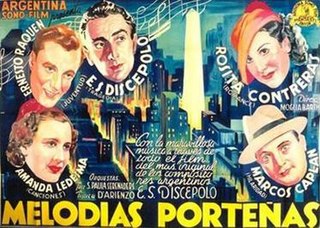
Melodías porteñas is a 1937 Argentine film, a musical directed and written by Luis Moglia Barth. It is based on a struggling radio station, and depicts the events leading up to and following the disappearance of the station's star tango singer, played by Amanda Ledesma. It may be seen as an exposé of the sensationalism of radio stations of the period. Enrique Santos Discépolo won praise for his performance as the increasingly desperate director of the station.

Conchita Montenegro was a Spanish model, dancer, stage and screen actress. She was educated in a convent in Madrid.

"Some of These Days" is a popular song, written and composed by Shelton Brooks, published in 1910, and associated with the performer Sophie Tucker.
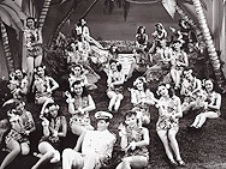
Gold Diggers in Paris is a 1938 Warner Bros. movie musical directed by Ray Enright with musical numbers created and directed by Busby Berkeley, starring Rudy Vallee, Rosemary Lane, Hugh Herbert, and Allen Jenkins.
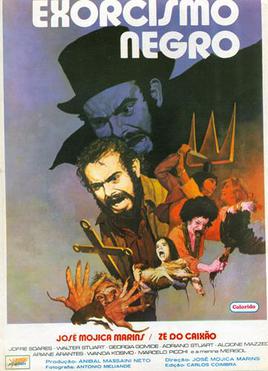
The Bloody Exorcism of Coffin Joe is a 1974 Brazilian horror film directed by José Mojica Marins. Marins is also known by his alter ego Zé do Caixão. It is one of several Marins' films that feature Joe as a major character, although it is not considered part of the "Coffin Joe trilogy".

The Strange World of Coffin Joe is a 1968 Brazilian anthology horror film directed by José Mojica Marins, who also plays his alter ego Zé do Caixão. The film is a collection of three short films titled O Fabricante de Bonecas , Tara (Obsession), and Ideologia (Theory). Joe only appears briefly in the role of a horror host, introducing the segments, and the film is not a part of the Coffin Joe trilogy. The hymn-like title song was written by Marins, and performed by Edson Lopes and Brazilian Samba band Titulares do Ritmo.
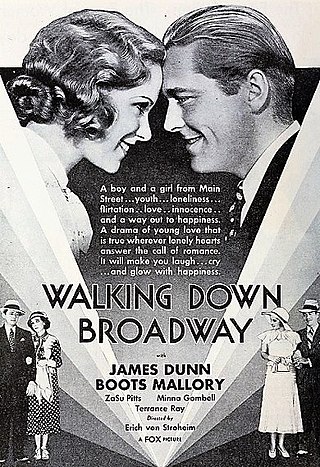
Hello, Sister! is a 1933 American pre-Code drama-romance film produced by Fox Film Corporation. It was directed by Erich von Stroheim, Raoul Walsh, Alfred L. Werker, and Edwin Burke, although none of those directors are credited. The film is a re-edited version of von Stroheim's now-lost film Walking Down Broadway.
The Little Damozel is a 1933 British romance film directed by Herbert Wilcox and starring Anna Neagle, James Rennie and Benita Hume. It is based on the 1908 play by Monckton Hoffe, previously filmed in 1916. The screenplay concerns a captain who pays one of his sailors to marry a woman who works in a nightclub. Dresses for the film were designed by Doris Zinkeisen.
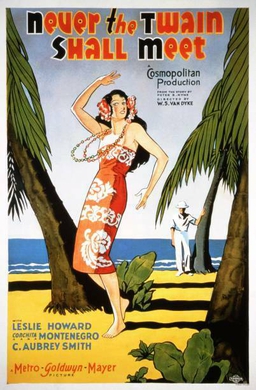
Never the Twain Shall Meet is a 1931 American drama film produced and distributed by Metro-Goldwyn-Mayer and starring Leslie Howard and Conchita Montenegro. It is based on the novel of the same title by Peter B. Kyne. The film was directed by W. S. Van Dyke and was filmed in Tahiti like Van Dyke's two previous south sea adventures The Pagan and White Shadows in the South Seas. The film is a remake of a 1925 silent film of the same name.

Pursued is a 1934 American drama film directed by Louis King and starring Rosemary Ames, Victor Jory and Russell Hardie. Produced and distributed by Fox Film Corporation. It is based on a story from the Saturday Evening Post, The Painted Lady, by Larry Evans. It was previously filmed by Fox as a silent When a Man Sees Red in 1917.

Love Comes Along is a 1930 American romantic film directed by Rupert Julian, written by Wallace Smith, based on the uncompleted play Conchita by Edward Knoblock. It was a vehicle specifically picked to highlight the vocal talents of Bebe Daniels, which also starred Lloyd Hughes and Montagu Love. It made a profit of $258,000.

Fray José de Guadalupe Mojica was a Mexican Franciscan friar and former tenor and film actor. He was known in the music and film fields as José Mojica.

Suburban Melody is a 1933 American pre-Code musical film directed by Louis J. Gasnier and starring Imperio Argentina, Carlos Gardel and Vicente Padula.
Melodies of America is a 1941 Argentinian musical comedy film directed by Eduardo Morera and starring José Mojica, Silvana Roth and June Marlowe. It was intended as an Argentine response to the Latin-American themed films produced by Hollywood as part of the Good Neighbor policy.
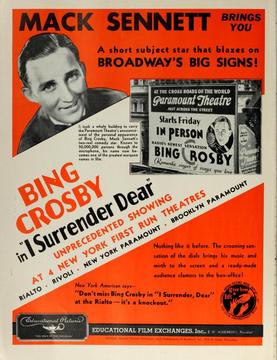
I Surrender Dear is a 1931 Educational-Mack Sennett Featurette starring Bing Crosby and directed by Mack Sennett. This was the first of the six short films Crosby made for Sennett and which helped launch his career as a solo performer.
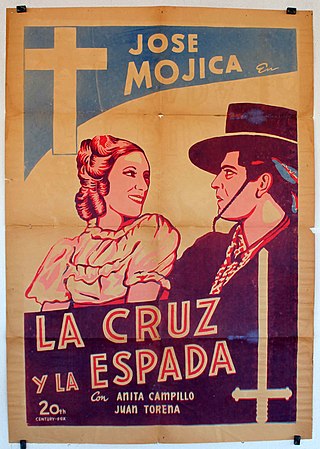
La cruz y la espada is a 1934 American Spanish language drama film directed by Frank Strayer, which stars José Mojica, Juan Torena, and Anita Campillo. The screenplay was written by Paul Schofield and William DuBois from a story by Miguel de Zárraga.
References
- ↑ "La melodía prohibida: Detail View". American Film Institute. Archived from the original on September 25, 2017. Retrieved September 25, 2017.
- ↑ "Filmarte Reopens Here This Week". The San Francisco Examiner . November 16, 1933. p. 13. Retrieved September 9, 2023– via Newspapers.com.
- ↑ ""Melodia Prohibada"". The Film Daily . March 28, 1934. p. 9. Retrieved January 13, 2024.